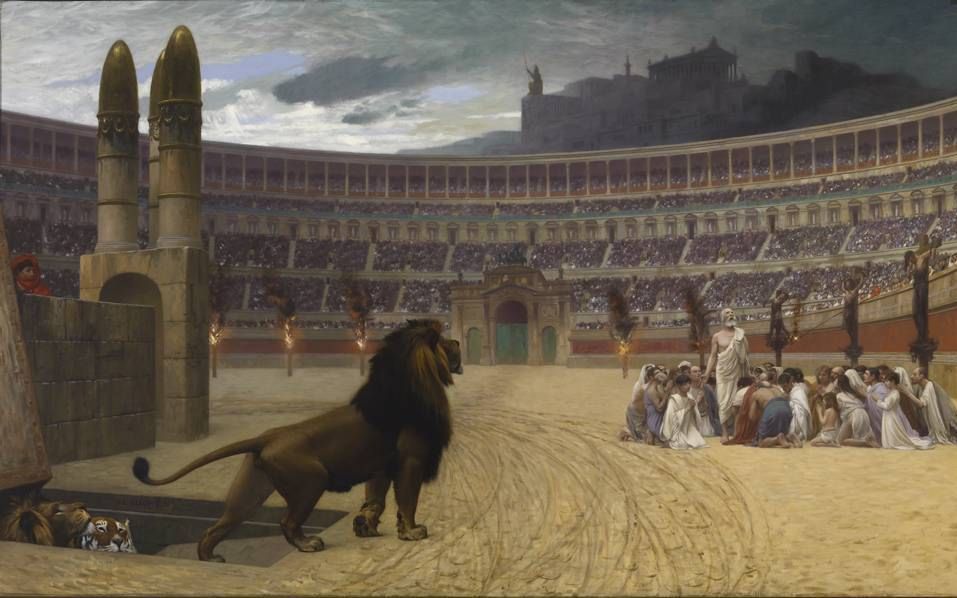Early Christians had respect for everyone's life
13-08-2021
Christian Life
Prof. Marten van Willigen

When witnesses of Christ were killed by wild animals in the Roman empire, fellow Christians came to collect the body and buried it. Picture RD
Christian Life
Respect for life. That is central for the early Christianity. Life is seen as God's gift. That is why the faithful treat it with care. They love their fellow men as themselves.
Greek culture also had a lot of respect for its fellow man. Various writers testify to this, including the famous blind poet Homer, Plato and his pupil Aristotle.
In his work "Ethica", Aristotle discusses, among other things, man's actions. He writes: "It is not he who is involved in an unjust cause who acts unjustly, but he who of his own accord does what is unjust, that is to say, the person in whom the act originates. This is also a recurring theme in the Greek tragedies: man is responsible for his own actions. He should treat his fellow man with respect.
The wealthy Roman writer and philosopher Seneca asked himself, in his old age, what the actual value of life was. He wrote the excellent "Letters to Lucilius" about this, which clearly show how much respect Seneca had for other people. In the so-called "Letter about the treatment of slaves", he writes that he is delighted when he hears of people who treat their slaves with confidentiality. And that was by no means standard.
Martyrs were buried
In early Christianity, the expectation of the second coming of Christ had a significant impact on the views on life and death. Believers could look forward to eternal life. Nevertheless, they considered earthly life precious. After all, in baptism, they had already been crucified with Christ, died, buried in the bath of rebirth, and subsequently resurrected with Him. In fact, baptism was the beginning of eternal life together with Christ.
Believers did not keep this expectation to themselves but shared it. In the persecutions of Christians, this was revealed very impressively. When the wild animals killed witnesses of Christ in the arena (many in the Colosseum in Rome), fellow Christians came to the organisers after the performance to ask for the body of the deceased witness. This was lovingly buried. Often in the catacombs, but sometimes also in a separate place. Later, a church was built near the grave of persecuted witnesses.
The early Christians were firmly committed to each other and had great respect for life. If in the pagan environment abortion was even practised by taking the poisonous potion, Christian authors told their believers to stay away from this.
Violent theatrical performances, where gladiators fought each other to the death, were rejected by Christian authors. In the first century, theatrical performances were already so brutal that even the non-Christian Seneca sighed: "I have become more inhuman because I have been among men."
The Church Father Augustine also pointed out that the mass hysteria in the theatre appealed to the wrong side of man. After his conversion, he didn't want to know about this any longer.
Love kiss
The Christians, who met in small groups, promised each other not to give false witness, not steal, and not kill. The respect for life was evident in this. The Ten Commandments were also read aloud in the meetings of the first Christians.
Christians were also fulfilling another commandment: to love one another with all their hearts. Impressive are the many inscriptions in the catacombs that give a clear impression of mutual love. Graves mention that the deceased was a believer, a "fidelis", who was loved by all.
The mutual love was further visible in the love meal ("agape"), where every believer was very welcome and in the kiss of love, with which brothers and sisters greeted each other. "Children, love one another with all your heart", a command of the apostle John, was generally known. John's disciples Polycarp of Smyrna and Ignatius of Antioch constantly practised this Christian love.
Of course, early Christianity was not a paradise where nothing ever went wrong. This period was also characterised by many struggles, especially over doctrines. Examples are the canonicity of Scripture, the Trinity and the natures of Christ.
Pandemic
Eusebius' "Church History" shows that Christians in the fourth century tried to help their fellow men wherever they could, believers and non-believers alike, out of respect for the lives of others. Not infrequently, they lost their lives in the process. This also happened during a pandemic. Very special.
However, the opposite also happened. In a sermon on John 15:22, Church Father John Chrysostomus is remarkably sharp towards the rich because they do not care about the poor:
"Let us not look away from those who are ruined by hunger. How is it possible not to find it strange that some people sit down at the table, laughing and enjoying the good life, hearing others –who are also in the same meeting place– pleading with them, not even responding to their pleas, but getting cranky about it and dismissing such a person as an impostor? (...)
Think with me of that day when we will stand before the judgment seat of Christ. When we ask for mercy, and Christ will say to us, after having put them in our midst: "How much pain did you cause these souls by not giving them one loaf of bread and one cent?" What shall we say then? What shall we say in our defence? That He will put them in our midst [that is certain]. Just listen to what He says: "If you have not done it to any of these, you have not done it to Me." (...)
Therefore, let us not regard wealth as something extraordinary. For it will be a means of furthering our punishment if we are not careful. Just as, if we watch out, even poverty will become profitable for us, yea, even a means of promoting true wealth and rest. And we lay off our sins even when we gratefully bear that poverty, and we obtain with God [so much] boldness. Therefore, let us not [here] seek careless rest. But let our goal be that we may [finally] enjoy that carefree rest there [namely with Christ and with God the Father and the Holy Spirit in heaven]."
The author is Professor of Bible Interpretation Early Church at the Theological University Apeldoorn in the Netherlands. This text was part of his lecture on "Respect for Human Life in Antiquity and Early Christianity". The article was published previously in the Dutch Reformatorisch Dagblad on May 22nd, 2021.
Related Articles




